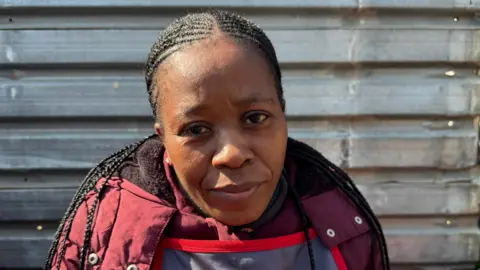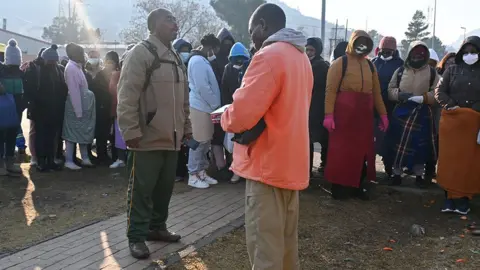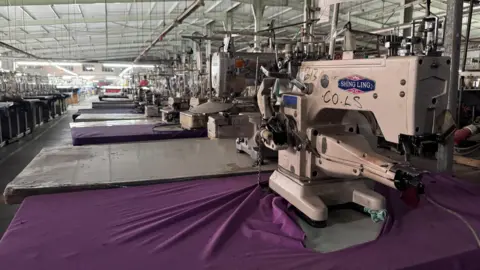JUL 29 – A garment manufacturing unit in Lesotho, which has produced Trump-branded golf shirts, might need to quickly shut down following the huge import taxes, or tariffs, imposed by the US authorities earlier this yr.
The small, southern African kingdom was hit with “reciprocal” tariffs of fifty% – the next price than every other nation – after they have been introduced by US President Donald Trump in April.
Although they’ve since been placed on maintain, Trump says they are going to be reimposed this Friday, 1 August, together with different nations all over the world, until a separate deal is reached.
“We don’t understand how we survive this one. We are going to die,” Aletta Seleso tells the BBC in a bleak voice standing outdoors Precious Garments, the place the Trump golf shirts have been made.
The mom of 1 younger youngster has labored there for nearly a decade, additionally supporting her prolonged household on her month-to-month wage of $160 (£120).
Lesotho has change into often called the “denim capital of Africa”. The nation’s garment factories additionally produce denims for iconic American manufacturers corresponding to Levi’s and Wrangler.
But the uncertainty over the way forward for the nation’s garments trade is one cause why Lesotho declared a national “state of disaster” earlier this month so as to velocity up job-creation.
 Ed Habershon / BBC
Ed Habershon / BBCThe BBC meets Ms Seleso throughout her lunch break simply outdoors Precious Garments.
She joins lots of of staff streaming out of the manufacturing unit with their lunch packing containers in a single hand and water bottles within the different as they attempt to discover a spot within the weak solar of the southern hemisphere winter to take pleasure in their home-cooked meals.
Most staff, with blankets wrapped round their our bodies, huddle in teams with their backs to the solar as they struggle to absorb a bit of heat.
She has been working on the manufacturing unit as an embroiderer for the previous eight years and had little cause to fret about her job – till the US tariffs announcement in April.
She says staff have been instructed that the agency “can shut any time from now”.
“They say it’s a few tariff,” she says.
In the meantime, Ms Seleso and her colleagues have been instructed to work for 2 weeks a month, that means they get simply half the pay.
She says it’s now “so laborious” for her to assist her youngster, mom and her late youthful sister’s two youngsters, who’re all beneath her care.
The BBC has approached Precious Garments for remark.
But Sam Mokhele, the secretary normal of 1 the unions representing 150 staff on the agency, says the corporate had not “indicated any signal of shutting down” in the meanwhile.
“But what they mentioned was [they may have to] shut down if issues don’t change,” he says.
Ms Seleso is interesting to the federal government to have interaction with the US and attempt to discover a viable answer to the tariff query.
Despite her determined state of affairs, she no less than nonetheless has an earnings – however others will not be so lucky.
On the opposite facet of city, in Maseru’s Thetsane industrial web site, dozens of determined job seekers collect outdoors one other garment manufacturing unit, CGM.
The manufacturing unit, one half of the CGM Presitex Jeans Manufacturer, has closed however there have been rumours it could quickly reopen.
The would-be staff stand in small teams, clutching water bottles, their solely supply of sustenance for the day, as they pay attention and hope they are going to be among the many fortunate few.
Among this group, principally girls, is Puleng Selane, who has been job-hunting since March.
Since 2018, the mom of three has labored as a safety guard, together with quite a lot of different jobs.
The younger girl now depends on the sale of medical face masks to assist her household – which even on day solely brings in sufficient cash to purchase maize meal and paraffin.
“Now life is so laborious… we frequently eat as soon as a day however generally go to mattress with none meals,” she says.
 Khanyisile Ngcobo / BBC
Khanyisile Ngcobo / BBCAlthough the 50% tariff has been paused, Lesotho’s exports to the US are nonetheless topic to a ten% tax, like the remainder of the world.
Until this yr, its exports had not been topic to any US tariffs beneath the African Growth and Opportunity Act (Agoa) – a regulation handed in Washington in 2000 to permit duty-free entry to the US for items from some nations so as to alleviate poverty and create jobs. This was a part of the “commerce not assist” philosophy.
The textile and garment trade is Lesotho’s largest personal sector employer offering, at its peak, round 50,000 jobs, out of a inhabitants of simply over two million.
The determine now hovers round 36,000 in response to the federal government, with 12,000 jobs instantly affected by the US tariffs.
Precious Garments at one level employed 4,000 staff.
But the Lesotho textiles increase boosted by Agoa meant that it had a commerce surplus with the US – exporting greater than it imports from the nation.
And that was why Trump imposed such excessive tariffs on the nation, which seem to have put an finish to Agoa, threatening the way forward for the one vivid spot within the nation’s economic system.
Despite the relative success of the garments factories – till now – the nation as an entire remains to be struggling to create sufficient jobs for its younger inhabitants.
Unemployment stands at 30% however for younger folks the speed is sort of 50%, in response to official figures.
Youth activist Tšolo Thakeli tells the BBC that even with out the most recent risk to the textile sector, the state of affairs is “tragic” as there are “actually no jobs within the nation, particularly for the youth”.
“We have graduates from each degree… not having jobs. There’s a critical state of hopelessness amongst the youth,” he says.
And whereas there are myriad causes, Mr Thakeli blames the “nepotism [and] corruption” that many allege runs rampant within the nation.
The 31-year-old entrepreneur and certified lawyer is a vocal critic of Lesotho’s authorities and was arrested after he posted a video on social media questioning whether or not Prime Minister Sam Matekane’s promise to create 70,000 jobs in two weeks was reasonable.
He tells the BBC the prime minister lacks a correct plan to sort out the disaster.
“There’s nothing tangible that the federal government has executed or set to deal with the issue. [It’s just] empty guarantees,” he says.
This is denied by Trade Minister Mokhethi Shelile, who insists that the federal government is working to try to resolve the difficulty.
“We already had some options, even earlier than the tariff was introduced, as a result of the US market was already starting to be a troublesome marketplace for us,” he tells the BBC.
He says the nation is “already shifting to manufacturing for South Africa” and that as issues stand, solely “20% of the garment trade provides the US market”.
Mr Shelile is talking to the BBC outdoors one other manufacturing unit hit laborious by the uncertainty brought on by the tariffs.
 Ed Habershon / BBC
Ed Habershon / BBCTZICC, owned by a Taiwanese nationwide, has been operational in Lesotho since 1999, producing sportswear for the likes of JC Penney, Walmart and Costco.
At the peak of operations, the agency produced 400,000 clothes a month however when the BBC visits, lots of of stitching machines lie gathering mud in one of many warehouses.
A supervisor on the agency, Rahila Omar, says the corporate’s 1,000 staff, principally girls, have been laid off for the subsequent 4 months resulting from a halt in orders.
“Because of the… stress of the tariffs, our consumers needed us to complete the order or the amount as quickly as we are able to. We got a deadline of 30 June, however we completed earlier than 30 June, and that’s why we’ve got a layoff,” she says.
Ms Omar says TZICC is ready for an replace on Agoa and whether or not the present tariff construction can be reviewed earlier than deciding on the subsequent step. Even if the present 10% tax remained, with out Agoa, it will not be sufficient for the agency to reopen as there can be “some further expenses” to contemplate, she explains.
And whereas the manufacturing unit additionally provides clothes to South African retailers, Ms Omar says the earnings generated from these pales compared to what the agency earns from the US market.
Despite the federal government’s assurance that it’s working to resolve the difficulty – with the minister even promising a determined passer-by who noticed him throughout our interview that “it’s going to work [out] on the finish of the day” – for Ms Seleso and Mr Thakeli, these are hole phrases for the nation’s despondent and hopeless workforce.
By BBC




